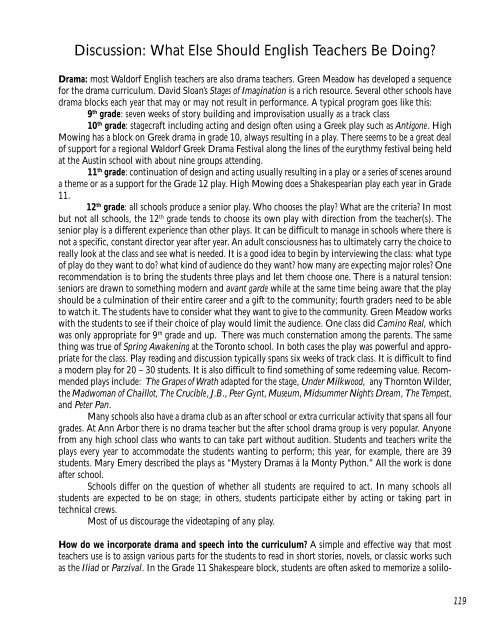Colloquium on English - Research Institute for Waldorf Education
Colloquium on English - Research Institute for Waldorf Education
Colloquium on English - Research Institute for Waldorf Education
You also want an ePaper? Increase the reach of your titles
YUMPU automatically turns print PDFs into web optimized ePapers that Google loves.
Discussi<strong>on</strong>: What Else Should <strong>English</strong> Teachers Be Doing?<br />
Drama: most <strong>Waldorf</strong> <strong>English</strong> teachers are also drama teachers. Green Meadow has developed a sequence<br />
<strong>for</strong> the drama curriculum. David Sloan’s Stages of Imaginati<strong>on</strong> is a rich resource. Several other schools have<br />
drama blocks each year that may or may not result in per<strong>for</strong>mance. A typical program goes like this:<br />
9 th grade: seven weeks of story building and improvisati<strong>on</strong> usually as a track class<br />
10 th grade: stagecraft including acting and design often using a Greek play such as Antig<strong>on</strong>e. High<br />
Mowing has a block <strong>on</strong> Greek drama in grade 10, always resulting in a play. There seems to be a great deal<br />
of support <strong>for</strong> a regi<strong>on</strong>al <strong>Waldorf</strong> Greek Drama Festival al<strong>on</strong>g the lines of the eurythmy festival being held<br />
at the Austin school with about nine groups attending.<br />
11 th grade: c<strong>on</strong>tinuati<strong>on</strong> of design and acting usually resulting in a play or a series of scenes around<br />
a theme or as a support <strong>for</strong> the Grade 12 play. High Mowing does a Shakespearian play each year in Grade<br />
11.<br />
12 th grade: all schools produce a senior play. Who chooses the play? What are the criteria? In most<br />
but not all schools, the 12 th grade tends to choose its own play with directi<strong>on</strong> from the teacher(s). The<br />
senior play is a different experience than other plays. It can be difficult to manage in schools where there is<br />
not a specific, c<strong>on</strong>stant director year after year. An adult c<strong>on</strong>sciousness has to ultimately carry the choice to<br />
really look at the class and see what is needed. It is a good idea to begin by interviewing the class: what type<br />
of play do they want to do? what kind of audience do they want? how many are expecting major roles? One<br />
recommendati<strong>on</strong> is to bring the students three plays and let them choose <strong>on</strong>e. There is a natural tensi<strong>on</strong>:<br />
seniors are drawn to something modern and avant garde while at the same time being aware that the play<br />
should be a culminati<strong>on</strong> of their entire career and a gift to the community; fourth graders need to be able<br />
to watch it. The students have to c<strong>on</strong>sider what they want to give to the community. Green Meadow works<br />
with the students to see if their choice of play would limit the audience. One class did Camino Real, which<br />
was <strong>on</strong>ly appropriate <strong>for</strong> 9 th grade and up. There was much c<strong>on</strong>sternati<strong>on</strong> am<strong>on</strong>g the parents. The same<br />
thing was true of Spring Awakening at the Tor<strong>on</strong>to school. In both cases the play was powerful and appropriate<br />
<strong>for</strong> the class. Play reading and discussi<strong>on</strong> typically spans six weeks of track class. It is difficult to find<br />
a modern play <strong>for</strong> 20 – 30 students. It is also difficult to find something of some redeeming value. Recommended<br />
plays include: The Grapes of Wrath adapted <strong>for</strong> the stage, Under Milkwood, any Thornt<strong>on</strong> Wilder,<br />
the Madwoman of Chaillot, The Crucible, J.B., Peer Gynt, Museum, Midsummer Night’s Dream, The Tempest,<br />
and Peter Pan.<br />
Many schools also have a drama club as an after school or extra curricular activity that spans all four<br />
grades. At Ann Arbor there is no drama teacher but the after school drama group is very popular. Any<strong>on</strong>e<br />
from any high school class who wants to can take part without auditi<strong>on</strong>. Students and teachers write the<br />
plays every year to accommodate the students wanting to per<strong>for</strong>m; this year, <strong>for</strong> example, there are 39<br />
students. Mary Emery described the plays as “Mystery Dramas á la M<strong>on</strong>ty Pyth<strong>on</strong>.” All the work is d<strong>on</strong>e<br />
after school.<br />
Schools differ <strong>on</strong> the questi<strong>on</strong> of whether all students are required to act. In many schools all<br />
students are expected to be <strong>on</strong> stage; in others, students participate either by acting or taking part in<br />
technical crews.<br />
Most of us discourage the videotaping of any play.<br />
How do we incorporate drama and speech into the curriculum? A simple and effective way that most<br />
teachers use is to assign various parts <strong>for</strong> the students to read in short stories, novels, or classic works such<br />
as the Iliad or Parzival. In the Grade 11 Shakespeare block, students are often asked to memorize a solilo-<br />
119

















